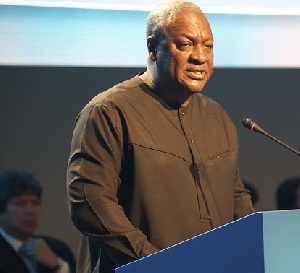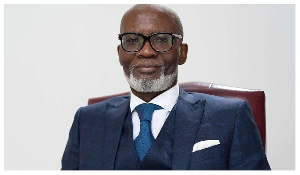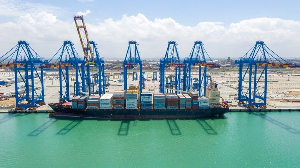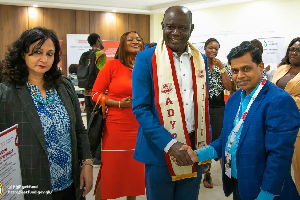The vivid and unforgettable image of a vampire State, sucking the blood of its host (Society), comes up consistently in the conversations Africans have on African politics. Ghanaians are no exception.
The statistical basis for casting a jaundiced eye at the State (as an African) is pretty clear. Transparency International well-regarded index does not do African countries any favors. Ghana, relatively speaking, does better than most sub-Saharan countries but still has significant issues around public sector corruption.
The traditional approaches to fighting corruption have been bandied around for many years and have wide spread acceptance; it goes without saying that it is important to be serious about incorporating these strategies into governance, given the link between corruption and mal-development.
I will quickly highlight the key to a sustainable and healthy public sector that acts as the catalyst for growth (as opposed to a cancer that kills). Very simply, small is good when it comes to the public sector.
In these times and given prior history, less government is better government! Fundamentally, the State has such a bad track record that reducing its sphere of influence as much as possible and letting it prove it can do that limited scope well is essential to growing it (the State) to the appropriate size.
My deeply felt belief is that radical surgery is needed at this time if Society and the Nation are to thrive going forward. This approach is not ideologically driven but is informed by the inherent pragmatism of an approach that says, the smaller the entity that is the prime “cause” of mal-development, the healthier our development would be.
Just so I am clear, by less government, I mean both the absolute size of government should be at the barest minimum and the scope of what government does should also be as small as possible.
The absolute size of government refers to the number of MDA’s and other trappings of government. We need to have a core philosophy of having a State that focuses on essential functions only, because for a small country striving to get richer, we really need to live according to our means.
The more MDAs we have, the more we spend on the “overhead” that is government. That is a direct cost that we should minimize in order to have a responsible fiscal profile which in turn has direct knock-on effects on deficit shortfalls, government borrowing and crowding out of the private sector due to high interest rates required to fund profligate governments.
A low “overhead” government is key to a low inflation environment and a better standard of living for all (including civil servants) which reduces the temptation to engage in corruption.
Turning to the scope of what government does: it is an inescapable truth that red tape breeds corruption just as the rainy season brings mosquitos. Ghana is a nation where everyone decries corruption but the majority aspires to be a “gatekeeper” of some sort in order to augment their income.
The public sector is now seen as an opportunity for enrichment and the notion of a public “servant” has long vanished from our vernacular. Reducing the role of government in permitting, regulating and otherwise controlling societal activity reduces the possibility of “toll-collectors” extorting monies.
Some examples will make clear exactly what I am talking about. Why do we have a Ministries of Food and Agriculture and a Ministries of Fisheries and Aquaculture? Why do we have a Ministry of Transport and a Ministry of Road and Highways? My naive analysis is that combining these entities is only logical. What does the Ministry of Environment, Science, Technology and Innovation actually do?
We are struggling in all these areas. Enough said about the Ministry of Employment! Let us take a look at other countries. We have at least 36 MDAs in Ghana today. Chile with an economy of 258Bn USD (roughly five times bigger than Ghana) has 23 via Wikipedia. Vietnam, with a history of heavy State involvement in the body politic has 22 MDAs and by the way their economy is 4 times the size of the Ghanaian economy.
At this stage of our development, an activist, visionary and disciplined Government would probably do more good than harm for our development. But the evidence is clear that we have not had that government and we will not get that government. Why? Because the rule of law is still weak andimpunity still reigns.
It logically follows then that if we cannot trust our Government to do the right thing, we should strive for as small a Government as possible. Q.E.D! Of course, we should strive for the elimination of impunity and the strengthening of the rule of law.
I do assert though that ameliorative initiatives in this vein will be made much easier if they are not going up against a malignant State that over time deems it essential to its survival to have its hand in every pot in order to perpetuate itself.
Milton Friedman’s quote is quite apropos at this point. Some may think a limited government focused on just external defense, domestic law and order and contract enforcement (between individuals) is a bridge too far (slow nod of head here). But how has the alternative so far worked out? Not very well is an understatement.
If there is consensus that Government is a significant cause of mal-development, then it is not really smart to default to growing Government whenever problems arise in our midst is it?
Turning to our politics: the “winner-take all” baked into the democracy we have today is not helping us develop a sustainable philosophy to governance. The spoils of victory are so intoxicating that there is zero motivation to actually shrink government once in power.
You can also forget about running on a platform that puts limited government front and center, the voting population now expects more and more outlandish promises of what will be done for them once you win power; in their hearts, they know this is a fantasy but what other leverage do they enjoy?
More importantly, the political class our leaders rely on to ride into power will look very askance at any initiatives that significantly reduce their ability to sell influence and better themselves economically. So we are left in a fantastical world where the actual reality of what gets done in governance is structurally at odds from what is required to put the country on a healthy growth path.
The danger we now face is the tarnishing of democracy in the eyes of our citizens, especially those most vulnerable in our society, as it continues to fail to meet their aspirations which in turn could lead to the emergence of potentially dangerous elements in our body politic.
We need to intensify the debate on what sort of country we want in the future and the way to get there. Those who run on a platform of anti-intellectualism and say we have no time for such conversations are like the explorer who wants to climb Kilimanjaro without a map or supplies.
When we begin to see a political discourse which is not just about winning power, but more importantly talks about using that power to unleash the God-given potential in all of us, we will then have started the hard and arduous task of de-programming our collective minds.
When we have more politicians who put country ahead of party and endeavor to act accordingly, we will have the right foundation for better governance.
When we have a citizenry that eschews cynicism and passivity, positively engaging in building a better future, and deciding to use its latent power to agitate for a good Society, we will finally begin to embark on that journey that leads to a Ghana that is truly the trendsetter for all of Africa.
Opinions of Monday, 8 August 2016
Columnist: Nana D. Manu















